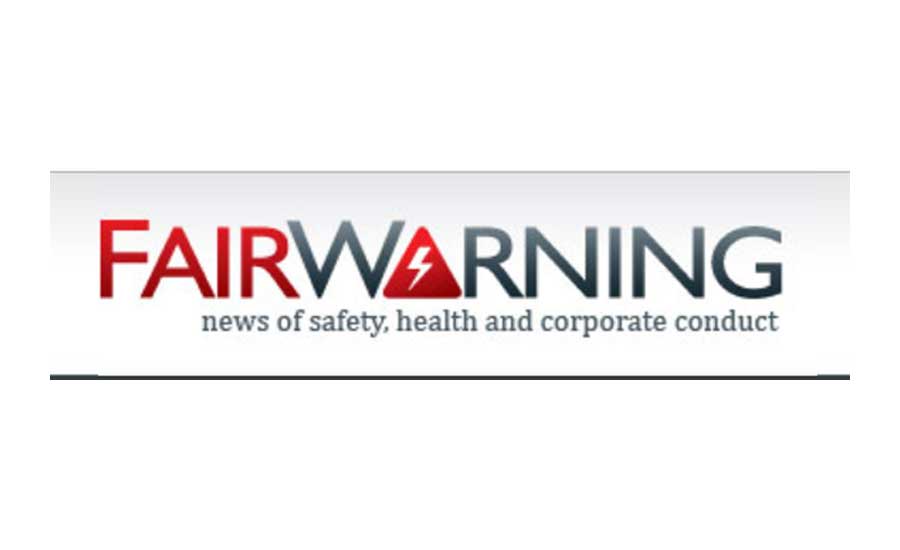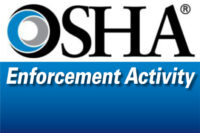Posted with permission from Fairwarning.org:
For the third time in six years, a branch of one of the world’s largest cargo-handling companies has been accused by workplace safety authorities of a willful violation linked to a worker’s death.
The most recent case, stemming from a death at the Port of San Diego, also marked at least the seventh time in a decade that a worker for SSA Marine Inc. has been killed on the job, according to government records.
Cal/OSHA announced last week that it is seeking $205,235 in penalties from SSA Pacific Inc., a division of Seattle-based SSA Marine Inc., for violations related to the death of Phillip Vargas, a 54-year-old stevedore and member of the International Longshore and Warehouse Union (ILWU) Local 29.
The accident occurred on Jan. 3 while Vargas was operating a Caterpillar forklift in San Diego. As he drove the lift into a storage shed, Vargas collided with a concrete support column, which threw him from the cab. Vargas suffered blunt force head and torso trauma from hitting the concrete floor and getting run over by the left wheel of the lift, according to a Cal/OSHA investigative summary. He was pronounced dead a few minutes later.
Cal/OSHA, the state agency that enforces worker health and safety standards in California, issued six citations to SSA Pacific, including one for willful safety violations, its most severe charge.
Ports are hazardous environments by nature, and many sea and rail terminal operators are cited for serious violations. But citations classified as willful—meaning an employer committed an intentional and knowing violation, or was aware that a hazardous condition existed and did nothing to repair it—are not frequently issued to U.S. terminal operators.
SSA Marine, which is owned by the holding company Carrix Corp., operates marine and railway terminals at over 250 locations around the world, handling over 113.1 million tons of conventional cargo each year. As a private company, there is little public information about SSA Marine’s finances, but several estimates have pegged its annual revenue at somewhere around $1 billion to $2 billion. Since 2016, the company’s SSA Pacific unit has been in the federal Severe Violator Enforcement Program, subjecting it to special scrutiny because of its track record of safety violations.
SSA earned its latest willful citation, Cal/OSHA said, because it had already been warned that it needed to do forklift safety checks and report unsafe conditions. In 2015, a worker at the Port of Long Beach was hospitalized after he and a colleague improperly tried to hoist a 15-ton forklift from the hatch of a ship with a crane.
Vargas was not wearing a seatbelt when he was thrown from the lift, according to the Cal/OSHA investigative summary. A mechanic working with SSA discovered that the seatbelt was in working order, but that multiple safety devices on the lift had been disabled. This included a seatbelt warning buzzer and a system designed to disconnect power from the hydraulic lift when the operator is unseated.
“Forklift safety and training of operators must be taken seriously,” said Cal/OSHA Chief Juliann Sum in a press release. “Employers must ensure that seat belts are used and that safety devices such as warning systems to ensure seat belt use are not altered.”
It’s unclear whether Vargas’ family has filed a worker’s compensation claim. His wife, Heather Vargas, could not be reached, and the president of ILWU Local 29, Bryan Brooks, did not respond to several requests for comment.
SSA Pacific has appealed Cal/OSHA’s citations, according to an email from SSA Marine vice president Bob Watters.
“Safety has been and always will be the number [one] priority for SSA Marine operations,” Watters wrote. “Our primary goal is to provide our employees a safe and healthy work place.”
Watters said he was unable to comment on the San Diego case but cited several safety awards SSA Pacific has received in recent years from the Pacific Maritime Association.
Other safety lapses surfaced in the other two SSA cases that triggered willful citations.
In November 2016, the U.S. Occupational and Safety Administration issued citations to SSA Pacific after 48-year-old longshoreman Jim Meadows fell to his death on a bulk carrier cargo ship at a pier in Longview, Washington. Instead of following rules that called for netting and temporary platforms to protect against falls, the company used “buddy systems” in which workers warned one another when one of them was working too close to hatches or risked falling overboard. The company is contesting a proposed $124,709 penalty.
Galen Blanton, OSHA regional administrator in Seattle, said in a press release in 2016 that Meadows death was preventable “if only a few common sense measures had been taken to prevent his fall and to protect his coworkers.”
SSA Marine was cited for a separate willful violation after Steve Saggiani, a 47-old-worker at the Port of Long Beach, was crushed to death by a 40-foot container on Jan. 19, 2012.
OSHA initially cited the company with three serious violations for exposing workers to crushing hazards and failing to provide accident prevention courses to supervisors, and one willful violation for allowing employees to work beneath a suspended container. The case was closed following a hearing before a review commission, but OSHA officials were unable to confirm before press time whether the violations were upheld. [Possible update to come here.]
At least four more deaths
Over the last decade, OSHA has recorded at least four other work-related deaths at SSA-operated terminals.
On July 8, 2008, an employee in Savannah, Georgia, with SSA Cooper LLC, a joint partnership between SSA Marine and another company, was crushed to death after a forklift knocked him between two bundles of 42-foot long pipes. OSHA cited the company for two serious violations, which were resolved in a settlement.
On Aug. 23 of that same year, a longshoreman at SSA Terminals in Oakland, California was knocked into the water by a 40-foot container. The Cal/OSHA investigative summary reported that he drowned before he could swim to safety, but news reports from the time indicate he treaded water for over a half-hour while coworkers frantically tried to find a ladder suitable for climbing down to reach him.
SSA faced citations for four serious violations and one repeat citation for a total of $63,000. The case settled with a penalty of $28,000.
On Nov. 4, 2010, an employee at SSA Marine Terminals in Long Beach was fatally injured after his utility tractor rig struck another vehicle. The impact ejected the employee from his vehicle, which continued to roll forward and crushed him. OSHA cited SSA for one serious violation, which was resolved in a settlement.
Another SSA employee death in a 2012 forklift accident in Washington did not trigger citations.
Injuries at SSA terminals haven’t been limited to employees. In 2011 a Los Angeles court ordered SSA Marine to pay $13.9 million to Felipe Curiel, a truck driver, who was severely injured after a 25,000-pound container was dropped on his cab in Long Beach. Shortly before Curiel’s accident, another driver at Long Beach, Pablo Garcia, was hit and killed by a tractor rig. This case resolved in a confidential settlement.
Spencer Lucas, an attorney with Panish Shea & Boyle LLP, represented Curiel and Garcia. He said he couldn’t speak to the safety standards of other SSA locations, but he saw serious issues at Terminal A in Long Beach.
“It seemed like a pretty pervasive disregard for safety at that SSA terminal,” Lucas said.
In 2016, the latest year for which statistics are available, 11 marine cargo handlers nationwide died on the job, according to the Bureau of Labor Statistics.
About FairWarning
This story was reported by FairWarning (www.fairwarning.org), a nonprofit news organization based in Pasadena, Calif., that focuses on public health, safety and environmental issues.


